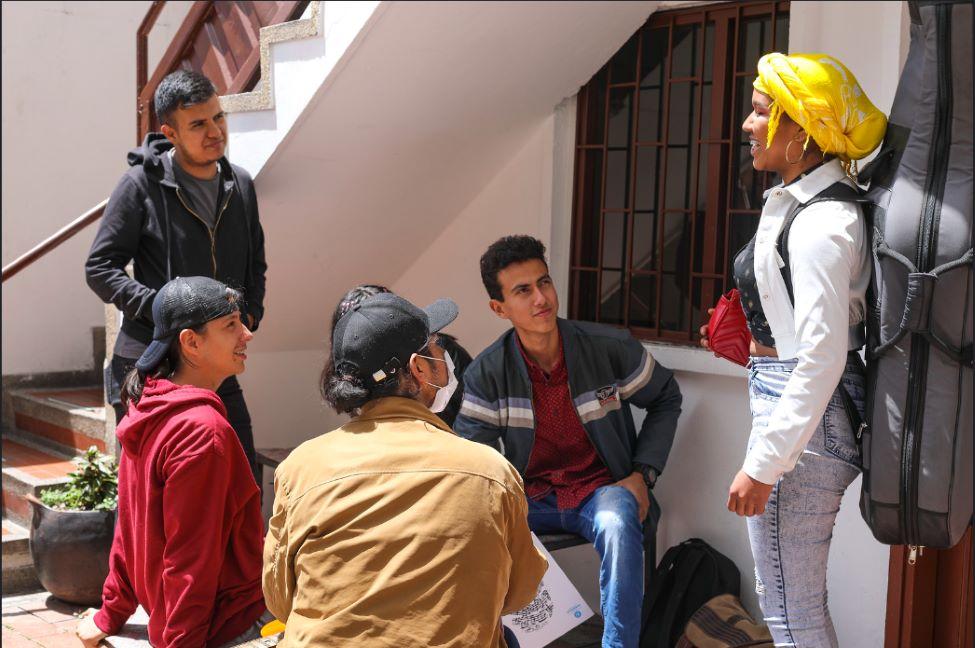Strengthening mental health and human capital in a social programme for vulnerable young people in Colombia
Background
Mental health problems can undermine the ability of young people to acquire training and education, affecting future life chances and generating a vicious cycle that reinforces poverty. Intervening to improve mental health may thus not only improve mental health but also contribute to breaking this cycle and reducing poverty. In Latin America, mental and substance use disorders account for a quarter of the total burden of disability. Yet, it is estimated that more than three quarters of them do not receive any treatment or support. This partly reflects the fact that low-and-middle-income countries (LMICs) spend only around 1% of their national health budgets on mental health. Digital technologies are increasingly considered a cost-effective alternative, given growing access to mobile and internet technologies. Evidence suggests that digital interventions can reduce depression and anxiety, especially if combined with a professional, peer or parent in-person element. However, few studies have implemented and evaluated the impact of these technologies among young people affected by poverty.
Colombia experienced more than five decades of armed conflict, which left high rates of structural poverty and an unparalleled legacy of mental health problems. Introduced in 2012 by the Colombian government, Jovenes en Acción - JeA (translated ‘Youth in Action’) is a national programme that offers conditional cash transfers and life skills training to more than 500,000 eligible young people to support them in undertaking university or vocational training. The programme has significantly improved access to post-secondary education. Yet, mental health problems associated with poverty and the armed conflict remain an important barrier to educational success and long-term wellbeing.
Aims
Our project aims to co-develop, implement and evaluate the impact of a sustainable and scalable mental health intervention that combines digital technology with peer-to-peer support among vulnerable young people in the JeA programme in Colombia. To this end, the project addresses four research questions to provide evidence for scaling up in Colombia and other low-income countries:
- What are the key features of a co-developed transdiagnostic stepped-care intervention that uses digital technology, training and peer-to-peer support to provide vulnerable young people in the JeA programme with the tools and skills to overcome depression, anxiety and post-traumatic stress disorder (PTSD)?
- Is the co-developed mental health intervention effective in reducing symptoms of depression, anxiety, and PTSD among vulnerable young people in the JeA programme in Colombia?
- Is the co-developed mental health intervention effective in improving human capital outcomes and long-term wellbeing outcomes of vulnerable young people in the JeA programme in Colombia?
- Is the intervention cost-effective and does it generate socioeconomic return on investment?
- Can evidence from Colombia inform the design, implementation and evaluation of local policy proposals to incorporate mental health interventions within existing social programmes targeted to young people in Honduras, Guatemala, El Salvador and Bolivia?
Relevance
We expect our project to improve the mental health, human capital and life chances of young people affected by poverty and conflict and help address the impact of poverty in Latin America. Based on recent frameworks, we expect mental health improvements to reduce poverty by generating changes in young people’s ability to acquire educational knowledge and skills, making decisions, economic preferences, and by reducing discrimination and stigma. In the long term, we expect mental health improvements to positively affect young people’s educational attainment, employment, income and poverty outcomes.
Our project aims to contribute to the 2030 Agenda for Sustainable Development in several ways. Mental health has been recently recognised as a key priority for global development; the Sustainable Development Goals (SDGs) explicitly pledge to step up efforts to improve mental health (SDG 3, target 3.4). Improving mental health can also play an essential role in reducing poverty (SDG 1), contributing to appropriate social protection systems (SDG target 1.3) and building resilience among people experiencing poverty (SDG target 1.5). Given the negative effects of mental illness on academic achievement, improving mental health is also a prerequisite to ensure inclusive and equitable quality education (SDG 4), and can contribute to reducing inequalities (SDG 10) and promote peace, justice and strong institutions (SDG 16). Our project is also aligned with Switzerland’s International Cooperation Strategy 2021-2024 objective to ‘ensuring quality basic services, especially to education and healthcare.

